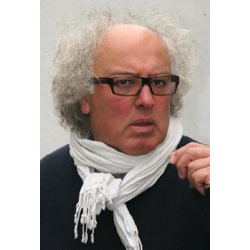Posts in this series:
Raindance 2011- Another Earth to open Raindance
- 18 World Premieres at Raindance
- Festival Preview: 10 Unmissable Raindance Films
- Another Earth
- Interview – Raindance Founder, Elliot Grove
- Skinning (Šišanje)
- Black Pond
- Fambul Tok
- Interview – Fambul Tok Producer, Libby Hoffman
- Hollow
- Amnesty (Amnistia)
- How To Start A Revolution
- Mesocafe
- By Day and By Night (De Dia y De Noche)
- The Box
- Victims
- Interview – Leaving Baghdad Director, Koutaiba Al-Janabi
- Leaving Baghdad
- Bonsai
- Face to Face
- The Ballad of Des and Mo
- Forget Paris
- No Return (Sin retorno)
- Holy Rollers
- The Wedding Party
- War Games
- Scenes of a Crime
- The Fifth Commandment (El Quinto Mandamiento)
- State of Emergency
- Top Ten: Raindance Films
Koutaiba Al-Janabi is an Iraqi-born cinematographer and director whose first feature film Leaving Baghdad is a deeply personal examination of collaboration and guilt in Saddam Hussein’s Iraq.
1. Can you tell us a little bit about yourself and why you made Leaving Baghdad?
I was born in Baghdad, Iraq and at age 17 I left Iraq and moved to Budapest, Hungary. I lived there for about 15 years, I studied photography, cinematography and wrote a PhD. In the early nineties I came to the UK and made shorts, documentaries and worked as a cinematographer on feature films. After a long time behind the camera as a cinematographer I wanted to make the transition to directing and Leaving Baghdad is my first feature film.
I made the film as a challenge to reflect my feelings, to touch one subject. That has always been my subject, exile. In the feature I decided to go deeper into the Iraqi person and tried to understand the person’s feelings.
 2. Did you find it cathartic once the film was completed?
2. Did you find it cathartic once the film was completed?
Yes, it was a big relief as I carried this story for a long time in my life. Leaving Baghdad is about a photographer who is working for a regime – recording birthdays and also executions – carrying his guilt with him. I had this question, nightmare about what would I have done had I stayed in Iraq and the regime had forced me to do this.
I shot it at the real locations where refugees move about, how they live, who they meet. It was a kind of personal journey.
It is also a relief to get the footage out. The film is dedicated to my father’s memory – he was assassinated by the regime and the film helped me deal with this and in a way stand up against it.
Yes – it will be in the cinemas there at the end of December. I am confident it will be well received. The film was shown at the Dubai International Film Festival, in one of the countries of production, and I saw how well people related to the story.
It is very important for me. It is about them, about us, and if they did not receive it well I had failed to convey my ideas. But they did receive it well. Everybody had such stories in them, all of them had the fear, know the feeling of paranoia and it seemed to have come through.
However, the film is not just relating to the events in Iraq. It can be related to regimes in Latin America, in the Middle East, all over the world.
In the Middle East, at the Gulf Film Festival, where the film won First Prize, it was very important for me, as film critics spotted it, the audience liked it and it is my first feature film. There were inteviews with me and when I went to Baghdad, people would recognise me on the streets and congratulate. It was a great feeling.
I am very pleased I kept the film from other festivals to have the European premiere at Raindance. Not simply because I am based in London, but the style of films at Raindance are very near to me, independent films. Also London is strategically very important. This helps the film to be in the spotlight.
Also the organisation and screening quality was very good. I feel lucky that it was selected and I was able to have the European premiere here.
